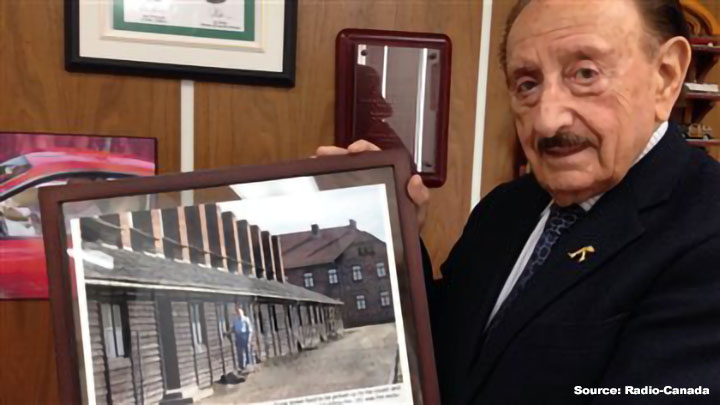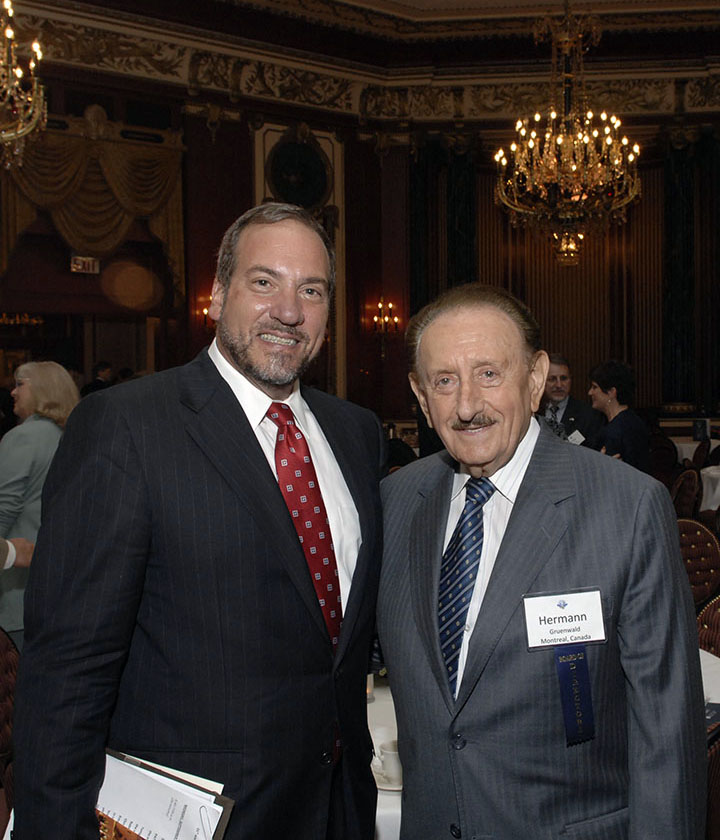
Hermann is sharing his story with Radio-Canada reporter Anyck Beraud, on life after the liberation of Auschwitz, and how he came to settle in Montreal
Many of us feel we live an ordinary life. But my friend, Hermann Gruenwald, truly lived an extraordinary life. Much of what happened in his life he wouldn't have chosen, yet there is one thing he did choose: he used his difficult life experiences to strengthen and inspire others. And indeed, he succeeded.
Hermann was one of the very few who survived the deadly Auschwitz and Birkenau death camps. The fact that God granted him the blessing of passing on Yom HaAtzmaut is — to me — a final act of Jewish solidarity in the face of history’s anti-Semites.
There is no doubt in my mind that God spared Hermann with the knowledge he would use his time wisely and to constantly be adding light to the dark world. Hermann served on the board at the International Fellowship of Christians and Jews of Canada as our longest serving member, where he had the ability to help those who had gone through the same living hell he had. His relationship with The Fellowship globally played an indispensable role in bringing on hundreds of thousands of Christian friends of Israel as partners in our work. That is just one accomplishment in a resume filled with notable achievements.
Hermann's extraordinary life stretched 94 years. He was born in Hungary to a loving family, yet his life with his parents and four siblings came to an abrupt halt in 1944. At just seventeen years old, he and his family were deported to Auschwitz. With great favour, intelligence, and ingenuity, he soon became the only Jewish cook in Auschwitz and Birkenau. He also saved countless lives by secretly trading food for medicine for those who needed it most.

Rabbi Eckstein and Hermann Guenwald
at the IFCJ US 25th Anniversary
He moved to Montreal after liberation, where he became one of the most successful manufacturers in Canada. He wrote his book “After Auschwitz: One Man’s Story” and began a second career in his 70’s speaking to students about his experiences during WWII and in the death camps.
Hermann believed that education was the key to ensuring that the world would never again see such horror. But he didn’t let his life be defined by tragedy. He remained a vibrant, loving, caring, and successful person who gave of himself to help others. Like many survivors, he carried with him terrible memories, yet he still found a way to shine a light even brighter than those adversities.
People like Hermann are the heroes of the Jewish people. Their stories and their inspiration are what get me out of bed in the morning, inspired to make a difference in the lives of folks who have been mistreated and who face injustice. It's people like him who remind me that everyone is able and responsible to do their best to fix this broken world.
My father, Rabbi Yechiel Eckstein, often acknowledged that whenever we hear of stories from the Holocaust, one of the main questions we ask is, “How did God let this happen?”
It is an age-old question: Why do good things happen to bad people and bad things happen to good people?
“Where was God?” is always our first reaction. It is a legitimate question to ask, but my father also taught me that you also have to ask not simply where was God, but where was man? Because ultimately life is a unique partnership between God and man.
God looks to us, His children, and asks us to fix the things that are broken, to shine light into the darkness, to overcome evil with good. We have the opportunity to be the blessing the world needs.
Hermann did that. He repaired the world. His memory is a blessing to Canada, to Israel, and to the entire world.
With blessings from the Holy Land,

Yael Eckstein
President
